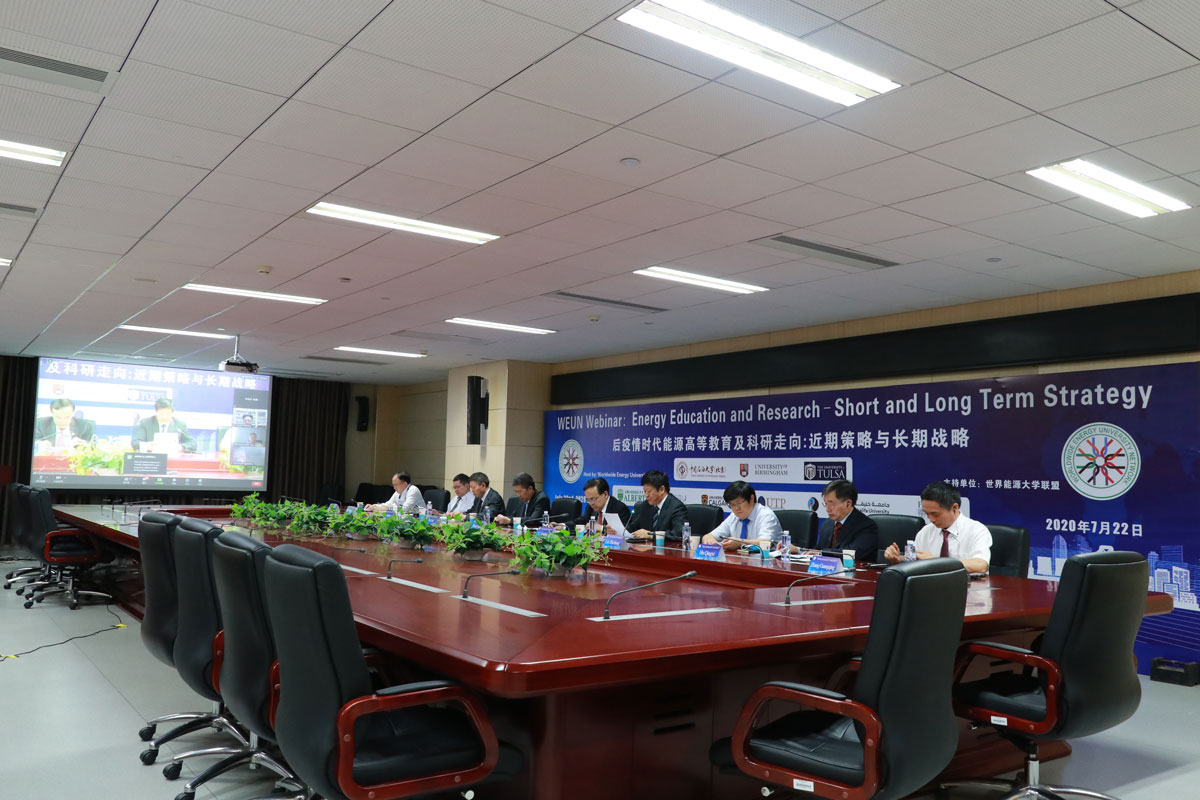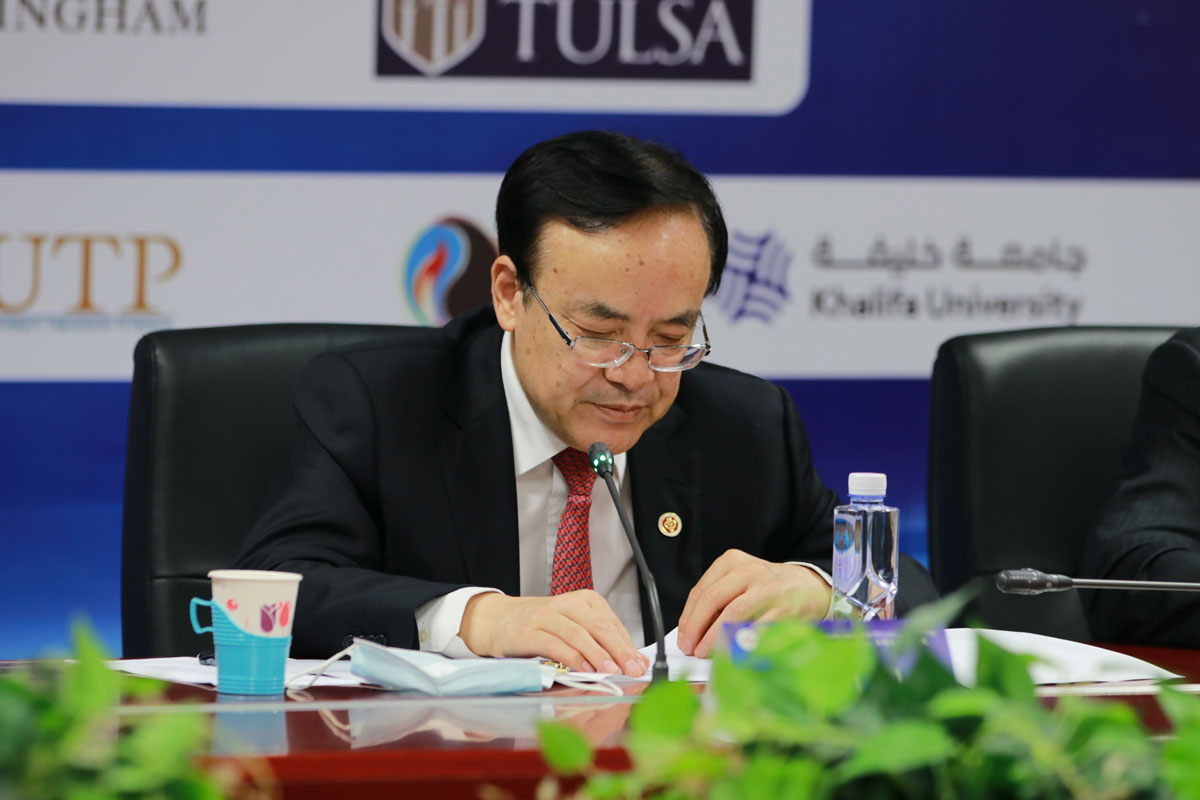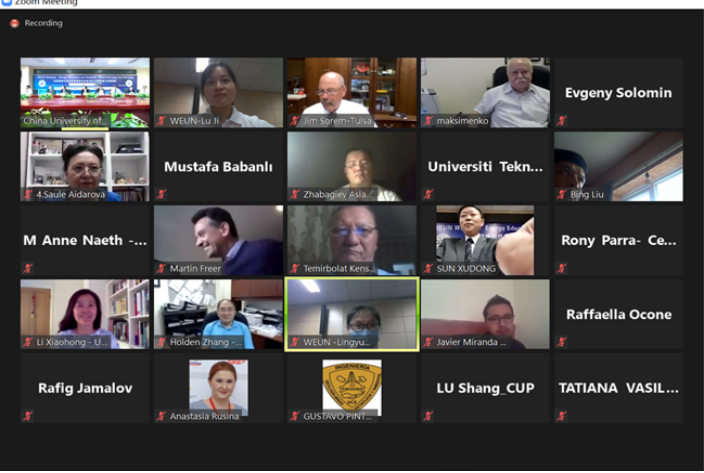To capture insights into the energy educationand research during and post COVID-19, and look ahead to new cooperationbetween energy universities under the new reality of energy industry, the World Energy University Network (WEUN) held an webinar on “Energy Education and Research – Short and Long Term Strategy”on July 22.The conference was organized by China University of Petroleum-Beijing (CUP) as the initiator and chairman of WEUN, together with the University of Birmingham, UKand the University of Tulsa, USA. Zhang Laibin, Chairman of the General Assembly of WEUN andPresident of CUP, Li Gensheng, Vice President of CUP, Sun Xudong, Secretary General of the WEUN Secretariat, Yao Jun, Deputy Secretary General of the WEUN Secretariat and other attendeespresentedat the meeting at the Beijing site.Representatives of the speaking universities includingUniversitiTeknologi PETRONAS, Malaysia, University of Calgary, Canada, Heriot-Watt University, UK, University of Birmingham, UK, University of Tulsa, USA, Khalifa University, UAE, Azerbaijan State Oil and Industry University, University of Alberta, Canada and Gubkin Russian State University of Oil and Gas, as well as representatives of other WEUN member universities participated through the online conference platform.The webinar was presided over by Li Gensheng, and the reporting sessionswere presided over by Jim sorem,Dean of College of Engineering and Natural Sciences ofthe University of Tulsa, and Martin Freer, Director of Birmingham Energy Institute of University of Birmingham.

The webinarwas widely concerned and participated by people from all walks of life, such as energy universities, energy industry and education administration departments at home and abroad. Nearly 200 university’s leaders, experts and scholars from 14 countries, attended the meeting online, including China, the United States, Canada, the United Kingdom, France, Germany, Portugal, Russia, the United Arab Emirates, Azerbaijan, Malaysia, Vietnam, Kazakhstan and Ecuador.
Zhang Laibin delivered a keynote speech at the conference on behalf of CUP. He said that the COVID-19 had caused unprecedented impacts on the global energy industry, and brought tremendous impact and reform to higher education and research in energy. Zhang proposed that in the post-epidemic era, energy universities should target the needs of the times and actively develop new cross-disciplines such as artificial intelligence, clean energy and renewable energy while continuously strengthening the development of traditional energy disciplines such as oil and gas, so as to give full play to the role of universities in leading scientific and technological progress. We should drive the development of universities with innovative ideas and create an online and offline talent training model that adapts to the situation in the post-epidemic era. He stressed that energy universities should jointly strengthen global cooperation in the post-epidemic era, foster new opportunities in the crisis and build a global community of higher education in the field of energy.

Mohamed Ibrahim Abdul Mutalib, Vice-ChancellorofUniversitiTeknologipetronas, Malaysia, Janaka Ruwanpura, Vice–Provost (International) of University of Calgary, Sebastian Geiger, Director of Research for the School of Energy, Geoscience, Infrastructure and Society (EGIS) and the Energi Simulation Chair in Carbonate Reservoir SimulationHeriot-Watt University, Martin Freer, Director of Birmingham Energy Institute of University of Birmingham, Jim Sorem, Dean of College of Engineering and Natural Sciences of the University of Tulsa, Steve Griffiths, Senior Vice President of Khalifa University, Mustafa Babanli, Rector of Azerbaijan National University of Petroleum and Industry, M Anne Naeth, Director of Future Energy Systems of University of Alberta and Alexander Maksimenko, Vice-Rector of Gubkin Russian State University of Oil and Gas successively gave keynote speeches. They spoke highly of the positive effects of this webinar and introduced achievements and plans in energy education and scientific research of their universities. They also analyzed the impact of the epidemic on the domestic energy industry and higher education, put forward countermeasures and long-term strategic plans accordingly, and forecast the development trend of energy higher education.The webinar also provided an online platform on which the participants actively exchanged ideas and sought the methods to expand the international cooperation network among universities under the framework of WEUN.

This webinarwas the start ofWEUN series of academic seminars. Representatives commendedthe webinar on its elaborate organization and topic selection. They hoped that more seminars could be held in the future. It fully demonstrated the recognition from member universities to WEUN that the webinar has got activeresponsesfromthem in a short period of time. With the support of member universities,WEUNis going to build more significant communication platforms for them.

